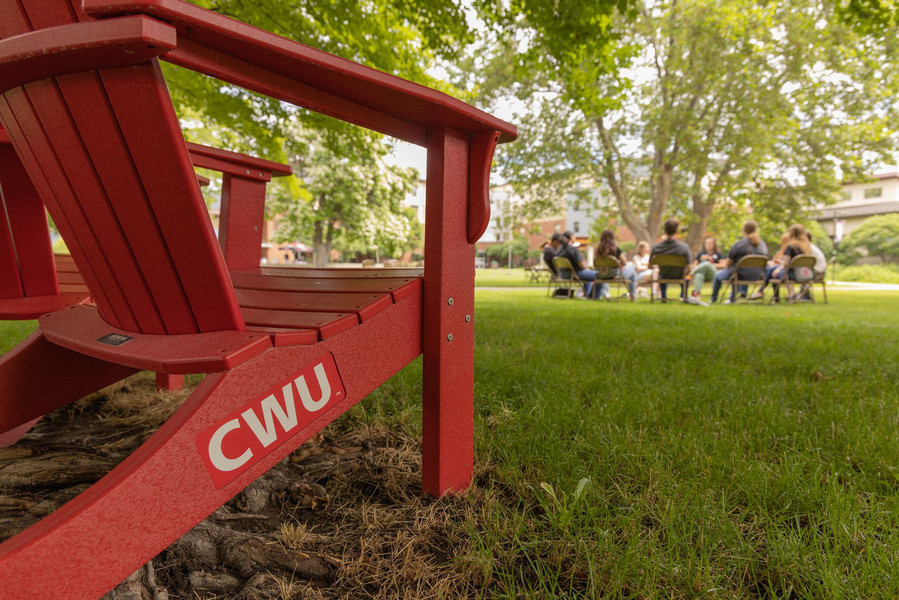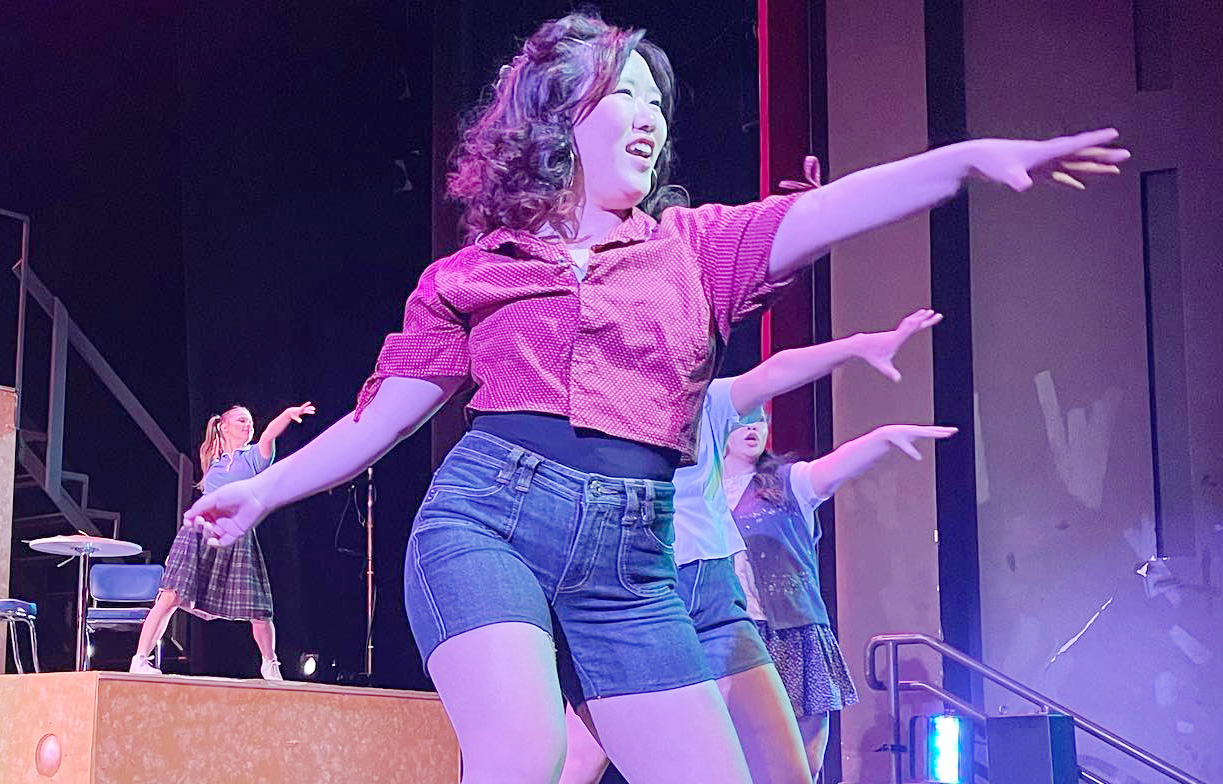
Diversity, Equity, Inclusivity
DEI Initiatives
These concepts guide institutional behavior: To be more diverse, CWU will celebrate, honor and understand differences. To be more inclusive, CWU must be welcoming and promote belonging. To provide equity of opportunity, CWU must ensure true access.
University-Wide Goals and Commitments
Student Enrollment and Retention
-
In alignment with CWU’s commitment to increase access to higher education for all demographic groups, one of the goals of our Strategic Enrollment Management plan is to increase the enrolled percentage of traditionally under-represented student groups (TUSG) from 32.6% in fall 2018 to 36.0% by 2024. TUSGs are students who are Hispanic/LatinX, Black/African American, American Indian/Alaskan Native, Pacific Islander, Asian, or multi-racial. This goal addresses our mission to become a more diverse, inclusive institution and to provide expanded opportunities to all of our students.
-
While recruiting new students is important, CWU is also committed to helping students persist as they progress through their second, third and fourth-years to then become graduates of CWU. In Fall 2019, President Gaudino established a university-wide goal to increase the freshman-to-sophomore retention rates from 71% to 80% in five years.
Faculty & Staff
- At Central, we want our faculty, students, prospective students, and staff to feel welcome and that they belong here. Achieving this will require us make our university as accepting and inviting as we can in order to expand our pool of qualified candidates for open positions. It is a university-wide goal to increase the diversity of our faculty and staff by 5 percent in five years, from 16% to 21%.
- An initiative to support Investment in Active Recruiting is led by the Interim Vice President of Diversity, Equity, and Inclusivity. This initiative provides one-time funding for proactive recruitment efforts of open faculty or staff positions, including attending conferences, professional group meetings, etc. Interested Hiring Managers and Search Committees can submit a request to Lucinda Carnell, Interim VP of Inclusivity & Diversity.
-
Black Talent Development Taskforce
DEI Faculty Fellow Anderson (Andy) Parks is co-chair for the Black Development Task Force.
The workgroup operates in conjunction with Washington Employers for Racial Equity (WERE), founded and led by former Governor Christine Gregoire, and includes Washington State business school deans and corporate leaders, creating a pipeline for Black and Indigenous talent. The first goal is to improve racial equity and advancement while working with students and business leaders, the second goal is to remove barriers, involving academic institutions and business leaders.
-
Connecting and Engaging CWU BIPOC Employees
Our vision is to create a warm and welcoming climate and physical space, particularly for BIPOC employees, where they can connect, collaborate, and build community.
- Quarterly "Happy Hour" Socials
- Second Thursday Morning Coffee Hours
- Virtual Town Halls
-
Deans' “Grow Your Own” Initiative
The initiative seeks to increase the diversity of faculty and staff through the recognition of adjunct faculty and employees who are one step away from their terminal degrees and provides support for them while they complete the degree.
-
Diversity Advocate Program
Overview
Established in 2019, The Diversity Advocate Program (DAP) was created to advance the university's efforts to obtain a workforce that is representative of the CWU student body. The mission of the DAP is to enhance equity, integrity, validity, and inclusivity in employee search and selection.
It is a human resources hiring procedure, that all Tenured Track Faculty and Director level and above searches have a diversity advocate. Email Andria Keirn to request a diversity advocate for your search.
Diversity Advocate Role
A Diversity Advocate should be a content-neutral, external member of the search committee who provides advice and consultation throughout the search and selection process. Diversity Advocates advance inclusive excellence by asking questions to test committee members thinking, identifying and encouraging inclusive hiring practices, and mitigating cognitive and structural biases that block employee diversity. As an external member of the committee, Diversity Advocates can explore assumptions, norms, standards and internal processes and patterns of behaviors that internal members may not notice or question. The Diversity Advocate plays an important role in developing the position description when applicable, recruitment, screening, interviews, references, evaluation, and the integration of new employees to the CWU community.
Become a Diversity Advocate
Complete a two-part Diversity Advocate Foundations training that helps advocate develops theoretical and practical foundation of current research on implicit bias, inclusive employment principles, diversity, and effective ways to be an advocate on a search committee. This foundation will inform how you approach your advocacy work and address how you respond to potential issues at each stage of the search process. The next training will be Spring, 2024: Foundations Diversity Advocate Training on Thursdays April 11 and 18 at 1:30 - 3:30 PM online, course code CW-2668-5. Please contact Sigrid Davison with any questions or accommodation requests.
Request a Search Committee Training
Planning a search? Request a Diversity Advocate Search Committee Training that addresses inclusive recruitment, hiring, and retention strategies, research on implicit bias, diversity, and more.
Questions?
Contact Sigrid Davison, Associate Director of the Office of Diersity, Equity, and Incusion.
-
Employees of Color Equity Council (ECEC)
- Initiated by the Vice President of Inclusivity and Diversity, the Employees of Color Equity Council (ECEC) was formed to widen the network of knowledge about the experiences of CWU employees on campus. The ECEC is further interested in fostering a positive campus climate for employees of color to retain their employment and support their development and career advancement. “Employees of color” refers to the racialized experiences of employees who identify as non-white. This clarification intends to affirm that employees who may not identify with the language “people of color” still experience marginalization based on their race or ethnicity. Examples include individuals who may identify as multiracial, indigenous, Southwest Asian, North African, and all other descriptors that do not follow an experience of whiteness. The ECEC works to improve the experiences of employees of color on campus and the connection of employees of color to the Ellensburg community.
- For the coming academic year, 2019-2020, the ECEC will focus on identifying and closing the gaps in inclusion, such as supporting employees for successful career trajectories, addressing the observed inconsistencies and disparities related to CWU policies and procedures, and offer strategies and assistance to the VPID to implement solutions. Members of the ECEC will work together to liaison with community board and council meetings, and develop partnerships with relevant community groups. There are several initiatives underway:
- Search committee representation: Kandee Cleary, VP for Inclusivity and Diversity will work with Human Resources and search committees to involve more employees of color, numerically on committees and proportionally across campus. The goal is to have at least two employees of color on each search committee. Further, Dr. Cleary will facilitate ways employees of color can be part of on campus interview process for prospective employees of color.
- Welcoming committee: This committee will support the onboarding of new employees of color. The purpose is to facilitate the new employee’s transition into the Central Washington University community by providing information and opportunities for a new employee to find his/her/their social-professional home.
- Community connection committee: This committee will link employees of color to becoming active and engaged citizens in the Ellensburg community. The purpose is to establish openings and connections for employees of color to participate in creating a community that is inclusive of their needs and interests.
- Mentoring program committee: This committee will develop and initiate a sustainable mentoring program for employees of color. The purpose of the mentoring program is to support employees of color career development and advancement for greater retention, engagement and satisfaction at Central Washington University. Possible areas of focus are: early career, English language learners, ++.
- Committee to explore former employee experiences: This committee will plan and gather information about the experiences of former employees of color and their motivations for leaving. The purpose is to gain an understanding of the shared experiences for intentional programming and policies to positively impact the experiences of current and new employees of color.
-
Equity Scorecard Steering Committee
- Our vision is to foster equity-mindedness through a climate of collaboration and courage, so that each individual will have the knowledge and tools to reflct on (1) their work and (2) performing their work.
- Identified partners and collaborators across campus:
- College of Business: possible individual departments and faculty;
- College of the Sciences: The Dean is inquiring about interested departments and faculty (Geology, Biology, Anthropology and Sociology seem to be most likely departments);
- Office of the Dean of Student Success: The Associate Dean will identify barriers to removing student registration holds, implementation of early alert systems, and tracking data related to non-returning students.
- The committee will use the Fact Book and academic/ Provost office data for validity and consistency.
- Benefits to CWU include increased student retention, enrollment, and postsecondary success. For faculty and staff, benefits include greater knowledge and understanding about inequity along with the capability to apply wider knowledge and understanding.
-
Faculty Fellows
This pilot Faculty Fellows initiative focuses on anti-racist training, and scholarship, and pedagogy related to faculty research; its goal is to meet the current needs for faculty training (pedagogical and interpersonal) as a retention effort for minoritized faculty and students, as well as to enhance the intellectual and educational lives of those most at risk of marginalization on our campus. These fellows will work directly with Dr. Kandee Cleary to support the urgent development of more substantial diversity and inclusion initiatives to address national conversations about race and racism, as well as ongoing issues within our institutional culture.
Training and Workshops Fellows, in conjunction with on-campus units like the CTE, will research and develop a training series for faculty and administration centred on inclusive and anti-racist training. This initiative would cover peer-to-peer relationships and supervisor-supervisee relationships, as well as pedagogical practices. This training is vital when many faculty will be motivated to address issues of racism in their courses and departments in the upcoming year, but will need to do so comprehensively and carefully so as to not alienate Black, Indigenous People of Color (BIPOC} students and faculty in particular who are especially vulnerable in these conversations. This initiative supports the work of individuals who have already been working in areas related to race and racism rather than risk implementing pedagogy not grounded in study or diverting support away from BIPOC scholar-teachers (“opportunity hoarding.”) This initiative intentionally draws on current faculty expertise and scholarship, and can be tailored to CWU’s particular pedagogical and cultural needs. Such training initiatives might occur alongside internal and external workshops, but its implementation by CWU faculty will allow for ongoing training and support, and make such programs readily visible on campus through the presence of our named institutional fellows. Fellows can also direct faculty advisors toward courses and programs (particularly in the IDPs, the Humanities, and Social Sciences) taught by other faculty that have established expertise in this work so as to avoid diluting current conversations about structural racism (the “anyone can teach about race” approach).
Fellows will gain administrative experience by working with other on campus units to determine the most cost-effective and appropriate training, and will draw on their expertise to do so. This will give fellows the chance to model how they connect their research and scholarship to the classroom through presentations. In addition, fellows will provide ad hoc webinars on current issues as they arise and on best teaching practices for incorporating pedagogy related to these issues.
Mentorship Faculty fellows will help establish an ongoing mentoring program for current faculty. This mentorship program will combine the aforementioned training initiatives with ongoing advising regarding institutional culture and development with a focus on BIPOC faculty. This project will involve scheduling consistent virtual meetings and connecting faculty to others with similar investments to strengthen faculty relationships with the institution.
Scholars of Practice/Research Collective Fellows will also assist in maintaining a Scholars of Practice (practice-scholar) initiative that will bring together faculty working on anti-racist and inclusive research and scholarship. This initiative will provide scholars working on similar topics to discuss, workshop, and conduct research together while receiving feedback from their peers. Faculty Fellows may first present their research for peers before facilitating other modes of research presentations for those within this network. This development and dissemination of educational innovations focused on anti-racist scholarship and practices will help support all faculty working in these areas; this approach is needed when such research has historically typically been rendered as less rigorous or as extraneous due to institutional biases across the nation. Providing dedicated research support for minoritized faculty of color in particular has proven to bolster retention by improving feelings of inclusivity and strengthening institutional ties (Rockquemore & Laszloffy, 2008; Haddix, 2016; Moody, 2013). The development of this Scholars of Practice Initiative will allow faculty to work collectively on campus to develop interdisciplinary outputs related to the above areas and help support and streamline faculty scholarship. This would also raise the profile and legibility of this work, which in turn addresses the devaluation of research interests from minioritized faculty that align with diversity, inclusivity, and social justice initiatives in particular.
Other duties might involve helping to promote and connect individuals to campus-wide book recommendations and discussions, participating in CWU’s institutional theme for the year, and developing a teacher-scholar profile page of faculty. This profile page will include teacher-scholars who have expertise in inclusive pedagogy to help connect faculty with one another when implementing new initiatives in the classroom. Faculty fellows might develop an application system for those who want to be incorporated on the scholar profile page and who have requisite training or expertise. This section is not exhaustive given the current uncertainty as to modality and classroom needs, but many of the above projects can and should make use of online platforms to disseminate much of this work should we remain largely onlineearch; its goal is to meet the current needs for faculty training (pedagogical and interpersonal) as a retention effort for minoritized faculty and students, as well as to enhance the intellectual and educational lives of those most at risk of marginalization on our campus.
-
IDEA 5227
IDEA (Inclusion, Diversity, Equity, Antiracism) 5227 is a legislative directive to implement antiracism expertise across campus.
Our vision is to provide antiracism professional development that is contextualized specifically to CWU. The aim is to build visibility and statewide recognition for CWU and stakeholder groups who will actively participate in the framework under development.
Two committees convened to implement programming:
- The Design & Development committee are experts in the field of DEI or have innate or acquired experience in the field;
- the Collaborator committee is made up of representatived from across campus.
-
White Bodies, Antiracist Praxis Workshop
Spearheaded by Hope Amason and Natashia Lindsey, the goal of the White Bodies, Antiracist Praxis group is to engage white-bodied faculty, staff, and administration in the Central Washington University community on issues of race, racism, and white supremacy and to promote antiracist practice. In doing so, we hope that participants will reflect on their racial position, challenge their assumptions about race and racism, identify ways in which they contribute to and/or are complicit in racism, and extend their antiracist practice to every aspect of their lives (whether professional, personal, or community contexts).
While all people, including people of the global majority and mixed folks, are welcome to join this group, it should be noted that goals and outcomes are directed towards white-bodied people who want to develop and extend their antiracist practice. As a space where white-bodied people can work to unlearn racism and white supremacy, it may be an unintentionally harmful space for people of the global majority.
-
Workforce Diversity Plan
The workforce diversity plan is an initiative to create and support a diverse workforce that is reflective of the communities we purport to serve. This is a commitment by the university to create a fair, inclusive workforce that promotes belonging. Workforce diversity is about respecting and valuing differences with a focus on traditionally underserved communities. Creating a diverse workforce is a priority of the university and the goal is to become the employer of choice for those with different backgrounds. A diverse workforce is a source of strength for the university and promotes student success.
Other Initiatives
There are multiple ongoing initiatives across campus that promote diversity among students, faculty, and staff:
- Enrollment Management has several initiatives that have shown success in recruiting students from traditionally underserved groups.
- Academic Colleges have initiatives that are moving forward. For example, the College of Business is part of the PhD Project which provides space for job announcements to minority candidates from AACSB accredited universities.
- The Library has initiated a cultural conversation series to discuss issues of white privilege, equity, and cultural similarities and differences.
- The Office of Business and Financial Affairs is developing an initiative to increase the use of Women and Minority owned businesses for contracting opportunities.
- Student Success has developed initiatives to support students from underrepresented groups by fostering leadership skills through the Student Leadership, Involvement, and Community Engagement (SLICE).
CWU News

CWU to highlight student research at next week’s SOURCE conference
May 8, 2024
by Rune Torgersen

CWU Theatre and Film to present ‘Footloose’ the next two weekends
May 8, 2024
by University Relations